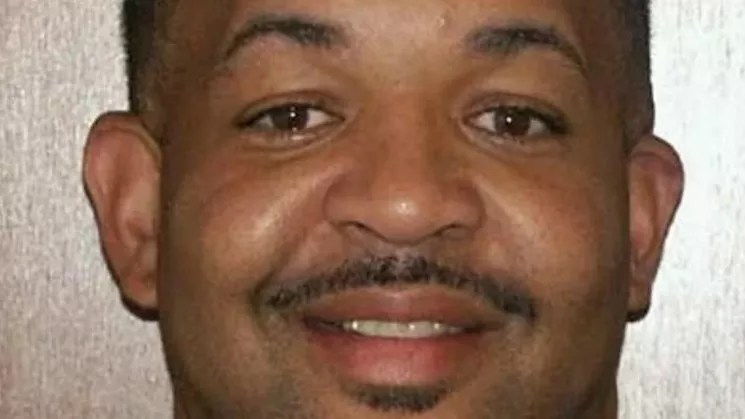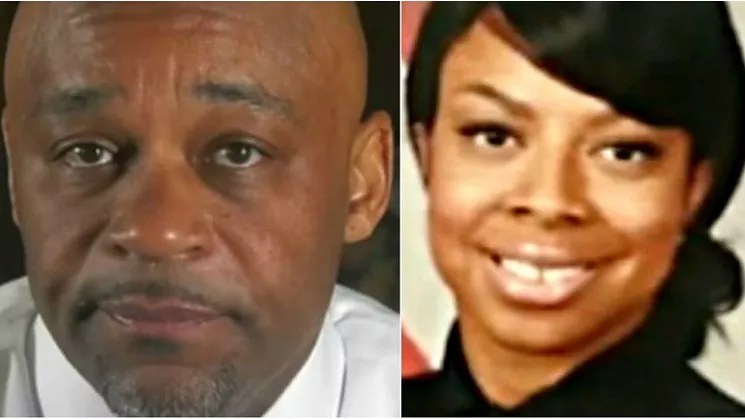
File photo

Audio By Carbonatix
Earlier this month, the lawyer for former City of Denver employee Wayne McDonald, who was paid $200,000 to settle a lawsuit four years after his 2012 firing, hinted that public statements made by Mayor Michael Hancock in his video apology for sending inappropriate texts to Detective Leslie Branch-Wise during the 2011-2012 period when she was on his security detail may have breached the agreement. Now, as Denver City Council is considering an investigation of the mayor, that attorney, Milwaukee-based William Sulton, has taken to the Denver airwaves to say he plans to file a new suit, in part because of what he sees as the city’s failure to share Hancock’s texts years ago.
Sulton, who took over the case following the retirement of his mother, original McDonald attorney Ann Sulton, first shared these thoughts on the KNUS program hosted by Craig Silverman, who says, “I wouldn’t want to be one of the lawyers involved in this for the city. It raises all sorts of questions and issues. It’s a hot potato, for sure.”
Silverman is himself a lawyer, and before going into private practice, he put in sixteen years as chief deputy district attorney for the Denver District Attorney’s Office. In his view, a new cause of action “should survive any challenge because of the first statement by Mayor Hancock and the allegations that evidence wasn’t disclosed.”
The aforementioned apology video was released after Branch-Wise went public about unwanted sexually themed texts sent to her by Hancock. One she shared with Denver7 viewers found Hancock asking if she’d ever taken a pole-dancing class before adding, “Be careful! I’m curious;)!”
At the outset of the video, Hancock says, “Six years ago, Denver police detective Leslie Branch-Wise was a member of my security team. In May of 2012, she called me. She let me know she had requested a transfer out of the unit because a member of my staff had sexually harassed her. I listened, and what I heard greatly disturbed me. I apologized that this had happened. We reviewed the matter and took immediate action. The employee was fired within days.”
That staffer was McDonald, who retained Ann Sulton’s services after being pink-slipped by Hancock. Ann, whom Silverman interviewed earlier this month, “is quite an interesting character – a trail-blazing civil-rights lawyer who, when she was in Denver, served as the legal counsel for the NAACP. She knew Michael Hancock pretty well when he was head of the Urban League, and she didn’t really know Wayne McDonald. But McDonald came to her and said, ‘Here’s what happened to me, and I don’t think it’s right.’ She investigated it, and she didn’t think it was right, either.”
Ann took McDonald’s case, “which resulted in a favorable ruling at his Career Services hearing, when they considered whether he should get unemployment,” Silverman goes on. “Then she filed a big federal lawsuit, which Judge [John] Kane threw out, probably before any discovery took place. From there, it went up to the 10th Circuit Court of Appeals, and they reversed, saying Judge Kane shouldn’t have thrown it out and there was a viable cause of action against the City of Denver and Michael Hancock.”

Michael Hancock and Detective Leslie Branch-Wise during the period when she was an officer on the mayor’s security detail.
YouTube/Denver Police Department
Around that period, Silverman notes, William Sulton took over McDonald’s defense, and “he was marching it up toward trial. But several weeks before it was supposed to start, he got contacted by Thomas Rice, the attorney hired by Denver to represent Hancock and the city, and he wanted to pay Wayne McDonald money. The deal was consummated for $200,000. But at the time, nobody told William about these sexually provocative text messages from the mayor, and if they had, he says he would have demanded and obtained a lot more than $200,000.”
According to Silverman, Sulton believes the texts “should have been disclosed during discovery, because you’re supposed to disclose relevant evidence even if the other side doesn’t make the picture-perfect request. And they would be relevant. Imagine if you’re Wayne McDonald. You get fired by Denver because you’re supposedly sexually harassing a fellow employee, and he says, ‘No, I wasn’t. I didn’t have anything to do with any of that’ – but they’re sitting on the fact that the mayor sent these text messages. Well, that’s problematic. When the mayor said in that video, ‘I got alerted to sexual harassment and I immediately fired the guy,’ we all know that guy was Wayne McDonald. So once again, he’s making the allegation that’s at the heart of the lawsuit, but he’s doing it in 2018.”
Silverman’s own investigation into the McDonald matter turned up Branch-Wise’s original request to be removed from Hancock’s executive security unit. No names appear in the document, accessible at the bottom of this post, but the text that’s visible appears to put the blame for her interest in leaving the position on bullying by fellow law enforcers. One passage quotes her as saying that “several times when she was in training, she was told to arrive at the City and County Building at a certain time. When she arrived at the appropriate time, she found that the unit had already left without her. Someone on the mayor’s staff told her that the other detectives in the unit were purposefully giving her inaccurate times so that she would be left behind.”
Branch-Wise received a settlement of her own from the city – $75,000, given to her in 2013. But in an email to Westword, Sulton contends that “Leslie Branch-Wise did not file a complaint of harassment or of a hostile work environment…. Wayne McDonald filed a lawsuit against Branch-Wise and Mayor Hancock (and others). Denver paid Branch-Wise $75,000 after the lawsuit was filed. That was odd at the time because the statute of limitations on pursuing an employment discrimination claim had expired. In other words, Branch-Wise lost any opportunity to sue Denver.”
Building on this observation, Silverman stresses that “if you make an employment claim, you have to go to the EEOC [Equal Employment Opportunity Commission] or a state corollary as a necessary predicate before you can file a lawsuit, and you usually have to do it within 180 days. If Branch-Wise never made that kind of complaint, any claim she made would have been time-barred by 2013. The city shouldn’t have been on the hook for anything because she didn’t jump through the proper hoops. So why did they pay her $75,000?”
After a pause, Silverman says, “That’s where you get into troublesome areas. Because that’s taxpayer money, and you don’t want to pay witnesses not to talk or to change their testimony or hide what they might know about the mayor.”
Whether the Denver City Council will look into this issue is unclear at this point. But in a statement released just prior to a new Denver7 interview with Branch-Wise, in which she said she wanted an inquiry into Hancock’s actions, council president Albus Brooks wrote that “no investigation could result in the public release of legally privileged matters that could subject the city to serious financial risk and legal liability under the non-disclosure clauses in the separate settlement with Mr. McDonald.”
In other words, Brooks doesn’t want to give William Sulton – who was back on KNUS yesterday, speaking with host Peter Boyles – any more reasons to sue than he already has.
Click to listen to Craig Silverman’s interview with Ann Sulton and William Sulton, as well as the initial 2012 Leslie Branch-Wise complaint about her work on Mayor Hancock’s security detail.